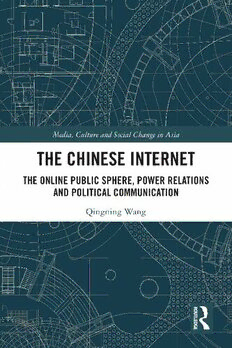Table Of ContentThe Chinese Internet
This book discusses the use of the internet in China, the complicated power
relations in online political communications, and the interactions and
struggles between the government and the public over the use of the inter-
net. It argues that there is a “semi-structured” online public sphere, in which
there is a certain amount of equal and liberal political communication, but
that the online political debates are also limited by government control and
censorship, as well as by inequality and exclusions, and moreover that the
government rarely engages in the political debates. Based on extensive orig-
inal research, and considering specific debates around particular issues, the
book analyses how Chinese net-users debate about political issues, how they
problematize the government’s actions and policies, what language they use,
what online discourses are produced, and how the debates and online dis-
courses are limited. Overall, the book provides a rich picture of the current
state of online political communication in China.
Qingning Wang is a lecturer in Media Studies in School of Arts, University
of Kent, UK
Media, Culture and Social Change in Asia
Series Editor
Stephanie Hemelryk Donald
Editorial Board:
Gregory N. Evon, University of New South Wales
Devleena Ghosh, University of Technology, Sydney
Peter Horsfield, RMIT University, Melbourne
Chris Hudson, RMIT University, Melbourne
Michael Keane, Curtin University
Tania Lewis, RMIT University, Melbourne
Vera Mackie, University of Wollongong
Kama Maclean, University of New South Wales
Laikwan Pang, Chinese University of Hong Kong
Gary Rawnsley, Aberystwyth University
Ming-yeh Rawnsley, School of Oriental and African Studies,
University of London
Jo Tacchi, Lancaster University
Adrian Vickers, University of Sydney
Jing Wang, MIT
Ying Zhu, City University of New York
The aim of this series is to publish original, high-quality work by both new
and established scholars in the West and the East, on all aspects of media,
culture and social change in Asia.
65 Media, Indigeneity and Nation in South Asia
Edited by Markus Schleiter and Erik de Maaker
66 Love Stories in China
The Politics of Intimacy in the Twenty-First Century
Edited by Wanning Sun and Ling Yang
67 Ethnic Minority Children in Post-Socialist Chinese Cinema
Allegory, Identity and Geography
Zhenhui Yan
68 The Chinese Internet
The Online Public Sphere, Power Relations and Political Communication
Qingning Wang
For a full list of available titles please visit: https://www.routledge.com/Media-
Culture-and-Social-Change-in-Asia-Series/book-series/SE0797
The Chinese Internet
The Online Public Sphere, Power
Relations and Political Communication
Qingning Wang
First published 2021
by Routledge
2 Park Square, Milton Park, Abingdon, Oxon OX14 4RN
and by Routledge
52 Vanderbilt Avenue, New York, NY 10017
Routledge is an imprint of the Taylor & Francis Group, an informa business
© 2021 Qingning Wang
The right of Qingning Wang to be identified as author of this work
has been asserted by her in accordance with sections 77 and 78 of
the Copyright, Designs and Patents Act 1988.
All rights reserved. No part of this book may be reprinted or
reproduced or utilised in any form or by any electronic, mechanical,
or other means, now known or hereafter invented, including
photocopying and recording, or in any information storage or
retrieval system, without permission in writing from the publishers.
Trademark notice: Product or corporate names may be trademarks
or registered trademarks, and are used only for identification and
explanation without intent to infringe.
British Library Cataloguing-in-Publication Data
A catalogue record for this book is available from the British Library
Library of Congress Cataloging-in-Publication Data
A catalog record has been requested for this book
ISBN: 978-0-367-34767-3 (hbk)
ISBN: 978-0-429-32782-7 (ebk)
Typeset in Times New Roman
by codeMantra
感谢母亲,送给父亲。
Contents
List of charts ix
Preface xiii
Introduction 1
1 Political communication and the online public sphere
in China: theory, debates and unanswered questions 22
2 Political contention in China’s online spaces 60
3 Equality and inclusiveness in China’s online space 106
4 Expressing political concerns online in China 130
5 Online political communication in China: government
censorship, engagement and reaction 160
6 Conclusions 203
Index 215
Charts
3.1 SFL analysis of five clauses of Section Two of the Sina
Weibo Community Convention 109
3.2 Numbers of VIP and non-VIP users participating in 21st
CER’s comments and retweets 117
3.3 Numbers of VIP and non-VIP users participating in
CCRN’s comments and retweets 117
3.4 Frequency of codes ‘Media’, ‘VIP’ and ‘Non-VIP’ in the 21st
CER posts, comments and retweets 118
3.5 Frequency of codes ‘Media’, ‘VIP’ and ‘Non-VIP’ in the
CCRN comments and retweets 119
3.6 Frequency of codes ‘Media’, ‘VIP’ and ‘Non-VIP’ and their
associations in the 21st CER posts, comments and retweets 120
3.7 Frequency of associations in codes ‘Media’, ‘VIP’ and
‘Non-VIP’ in the CCRN’s posts, comments and retweets 122
3.8 S FL analysis of texts on CCRN containing code ‘Big V’ 123
3.9 Frequency of appearance of ‘Celebrity’, ‘VIP’ and ‘Non-
VIP’ in the Sina Entertainment and @Quanlaohan posts,
comments and retweets 127
3.10 Associations of ‘Celebrity’ and ‘VIP’ in the Sina
Entertainment and @Quanlaohan posts, comments
and retweets 127
4.1 Appearances of ‘government’ and ‘party’ in 21st CER
Weibo posts, comments and retweets (specifying levels of
authority) about the Kunming refinery 134
4.2 Appearances of ‘government’ and ‘party’ in CCRN
Weibo posts, comments and retweets (specifying levels of
authority) about the Kunming refinery 135
4.3 The associated roles and issues of the government in
21st CER’s posts, comments and retweets about the
Kunming refinery 136
4.4 The associated roles and issues of the government in
CERN’s posts, comments and retweets about the
Kunming refinery 136

